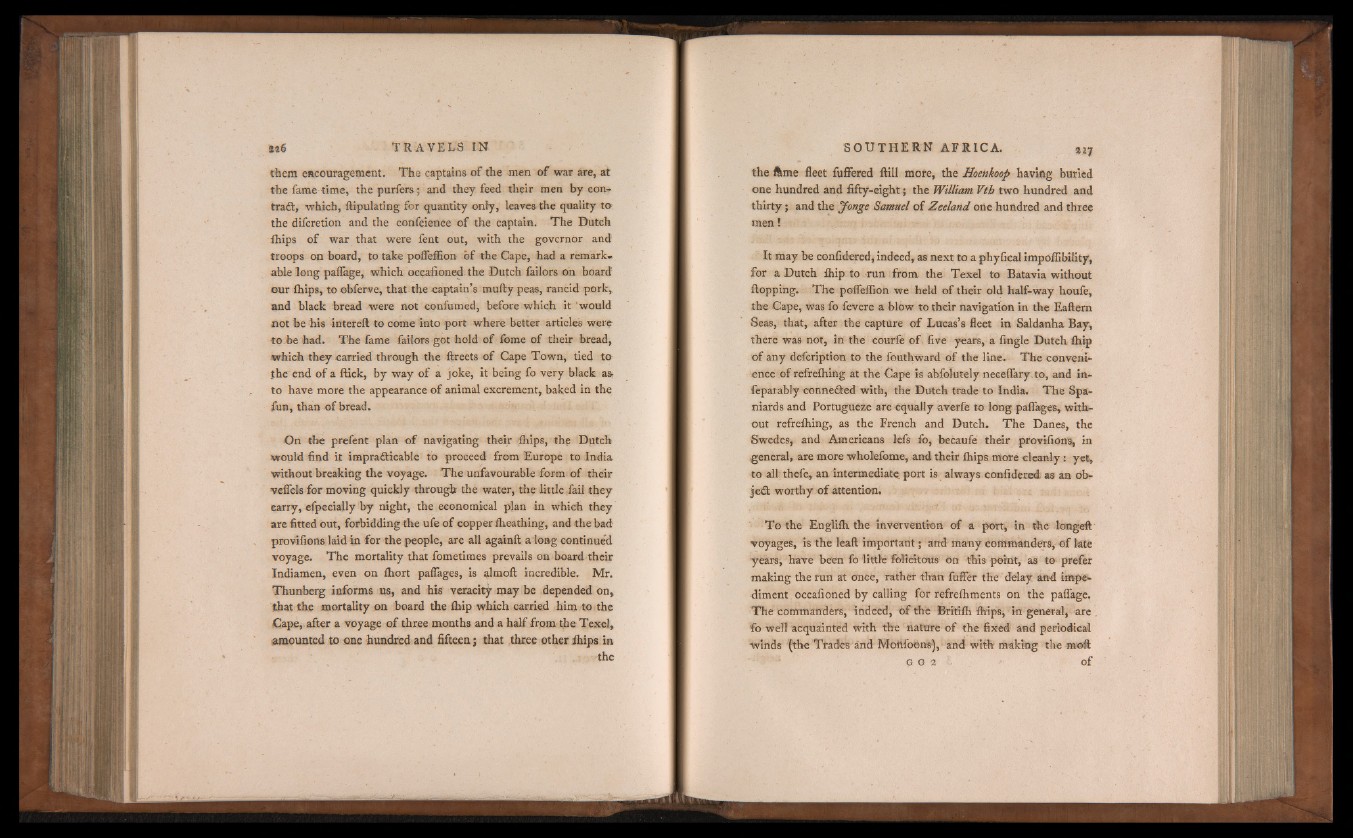
them encouragement. The captains of the men o f war are, at
the fame time, thepurfers; and they feed their men by contrail,
which, ftipulating for quantity only, leaves the quality to
the difcretion and the confcienee of the captain. The Dutch
{hips of war that were fent out, with the governor and
troops on board, to take pofleffion of the Cape, had a remark»
able long paflage, which occafioned the Dutch failors on board
our lhips, to obferve, that the captain’s mufty peas, rancid pork,
and black bread were not confumed, before which it would
not be his intereft to come into port where better articles were
to be had. The fame failors got hold of fome of their bread,
which they carried through the ftreets of Cape Town, tied to
the end of a flick, by way of a joke, it being fo very black as.
to have more the appearance of animal excrement, baked in the
fun, than of bread.
On the prefent plan of navigating their ihips, the Dutch
would find it impracticable to proceed from Europe to India
without breaking the voyage. The unfavourable form of their
veflels for moving quickly through the water, the little fail they
carry, efpecially by night, the economical plan in which they
are fitted out, forbidding the ufe of copper fheathing, and the bad
provifions laid in for the people, are all againft a long continue'd
voyage. The mortality that fometimes prevails on board their
Indiamen, even on ihort paflages, is almoft incredible. Mr.
Thunberg informs us, and his veracity may be depended on,
that the mortality on board the ihip which carried him to the
Cape, after a voyage of three months and a half from the Texel,
amounted to one hundred and fifteen; that three other Ihips in
the
the Ame fleet fuifered ftill more, the Hoenkoop having buried
one hundred and fifty-eight; the William Vth two hundred and
thirty; and the Jonge Samuel of Zeeland one hundred and three
men!
It may be confidered, indeed, as next to a phyfical impoifibility,
for a Dutch £hip to run from the Texel to Batavia without
flopping. The poffeifion we held o f their old half-way houfe,
the Cape, was fo fevere a blow to their navigation in the Eaftern
Seas, that, after the capture of Lucas’s fleet in Saldanha Bay,
there was not, in the courfe of. five years, a fingle Dutch Ihip
of any description to the fouthward of the line. The convenience
of refrefliing at the Cape is abfolutely neceflary to, and in-
feparably connected with, the Dutch trade to India. The Spaniards
and Portugueze are equally averfe to long paflages, without
refreihing, as the French and Dutch. The Danes, the
Swedes, and Americans lefs fo, becaufe their provifions* in
general, are more wholefome, and their ihips more cleanly: yet,
to all thefe, an intermediate port is always confidered as an object
worthy of attention.
To the Engliflr the inverventron of a port, in rite longeft
voyages, is the leaft important; and many commanders, of late
years, have been fo little felicitous on this point, as to prefer
making the ran at Once, rather than fuffer the delay and impediment
occafioned by calling for refreihments on the paflage,
The commanders, indeed, of the Britiih lhips, in general, are
fo well acquainted with the nature of the fixed and periodical
winds (the Trades and Mottfoens^, and with making the mak
g g 2 o f